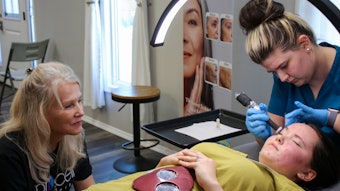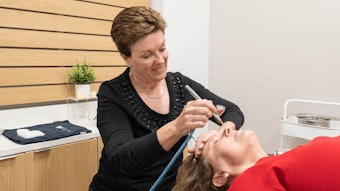
Many professionals from the traditional medical industry are jumping into the spa game, facing a learning curve when it comes to training, compensating and holding professionals accountable for services rendered.
Medical professionals such as nurses and physician’s assistants are most likely accustomed to salaried positions, so it will be necessary to train them in performing services based on dollar incentives or commissions. Conversely, spa professionals such as estheticians and massage therapists may be more accustomed to having customer service and performance tied into their pay. Take into consideration that you may be bringing two different types of professionals together, and the accountability goals you are looking for may be new to both of them.
Systems and structures are more important than ever with skin care business’ narrow profit margins and resources for qualified personnel. The old style of creative leadership with lack of organization or hierarchy management styles that fail to create collaboration or teamwork are no longer able to sustain themselves in today’s fast-paced competitive market. It is more important than ever to put together a game plan for your team that instills and builds upon leadership and growth.
Professional culture
Creating a culture that is unique to your spa is crucial for building your business. Establish common values and goals for both your team members and the business. In addition, employees need to be aware of the various goals, as well as their roles in achieving those goals.
Establishing shared goals and values via a mission statement and job descriptions will get everyone on the same page. People tend to rise up to the level of expectation, so knowing what is expected of them will increase the likelihood that they will achieve their goals.
Mission statements. Your mission statement is one to two sentences stating what your business is and its purpose. When hiring team members, engage people who inherently share the values and purpose of the business’s intentions.
An example mission statement might read: “Our ultimate goal is to create a pleasant and relaxing atmosphere for our clients. As a full-service facility, we strive to meet and exceed every client’s expectations and needs. We make every effort to be a leader in our industry, and our commitment is to first listen to your needs, and then respond. We look forward to becoming a part of your wellness regimen and welcome the opportunity to serve you.”
This would be something for clients to look to when they want to know what your business stands for and understand the team’s goals.
Job descriptions. Spas and medical spas have an intimate impact on the lives of their clients, and it is this unique relationship you must emphasize to all your team members who need to understand the importance of their jobs and specific duties in order to deliver a consistent extraordinary client experience. When you have clear expectations in place, there won’t be any gray areas, and you can coach your team members effectively.
For example, job descriptions need to be defined in writing, understood and signed by the team member performing those duties. (See Sample Job Description.) Your descriptions should include the following employee requirements.
- Appearance and dress policy
- Dispensary policy
- Cleaning and sanitation policy
- Financial and compensation goals
- Staff meeting policy
- Career development and advanced training requirements
- Scheduling policy
- Client information and confidentiality
- Extraordinary client experiences
- Personal services and product costs
Employee performance. Let your team members know how their job performance is going to be measured. This will allow them to focus on the specific areas where they need to apply their skills.
Use the following nine performance evaluation examples as a starting point.
- Job performance—Meeting and exceeding performance goals as they relate to sales, retail, client retention, education and all other performance objectives
- Job knowledge—Understanding of job responsibilities and departmental procedures
- Productivity—Volume of adaptable work produced, meeting job standards, taking initiative and maintaining a number of personal bookings
- Quality of work—Accuracy, thoroughness and attention to detail in daily work
- Establishing and meeting priorities—Using priorities as a way to plan work, budget time to meet deadlines and finish work in a smoothly flowing manner
- Challenge-solving—Independent challenge-solving skills, resourcefulness and amount of supervision needed
- Communication and interpersonal skills—Written and oral communication skills with supervisors, co-workers and clients, ability and willingness to establish and maintain cooperative relationships
- Adaptability—Ability to adjust to changing conditions, meet peak work loads and master new procedures and responsibilities
- Attendance and punctuality—Period covered, days absent, number of occasions or classes missed, late starts and leaving shifts early
One-on-one time
Spend 15 minutes each week going through employees’ goals and financial accountability in regard to their specific jobs. Formally schedule meetings with each of them in order to be consistent and effective.
Meetings such as these are necessary because you are laboring side by side with your team members and need to keep them focused and accountable in reaching their goals. It is shifting from telling them what to do to asking them questions and listening for distinctions you can use to help them grow. This takes practice, and when it is working well, it becomes the fastest way for your business to grow.
Focus and work with your team members on setting goals in the growth areas of your business. Retail sales, client referrals, pre-bookings and premium service promotions should be at the top of the list. Help them practice dialogues and create strategies to support these initiatives moving forward. Ask questions about how they are going to achieve the goals you set together, and keep asking them until they come up with solutions and ideas on how they will achieve them.
If you have a large team, ask your managers or department heads to support you in this coaching process. Your team members will appreciate you for taking time to focus positively on them.
Molding a top team
Creating a dynamic team takes time, dedication, and listening and responding to its needs. This way, you see your people grow and achieve goals they never could have imagined otherwise. By creating these relationships, the connections you have will be richer, more rewarding and—more than likely—your emotional and financial bottom line will reflect this excellence.
Bryan Durocher is the author of Wake Up … Live the Life You Love in Beauty (Global Partnership, LLC, 2006), an expert for Health Journal TV and Life and Leisure TV, a contributor to NBC’s South Florida Today, and the founder of Durocher Enterprises. Durocher Enterprises provides coaching, consulting, global industry trends, marketing solutions, and website and e-commerce development for spas, medical spas and industry professionals internationally.










